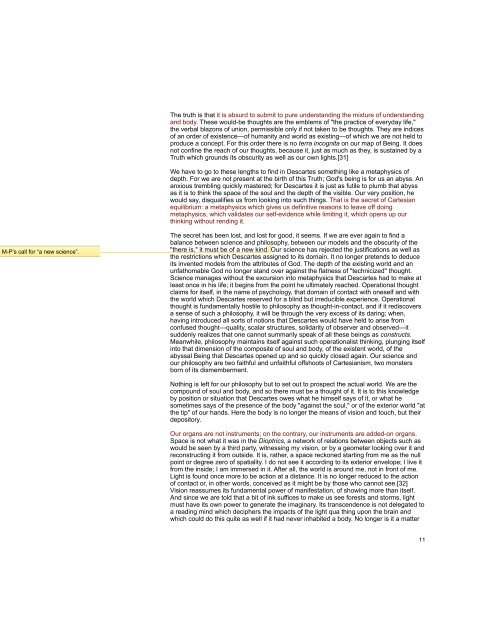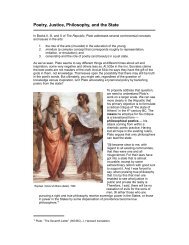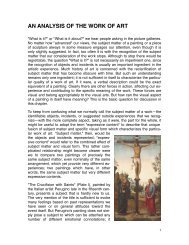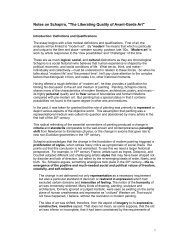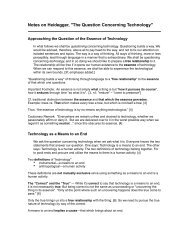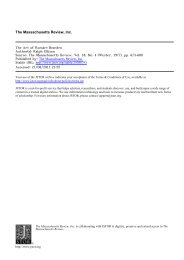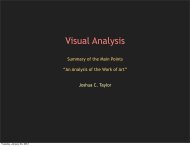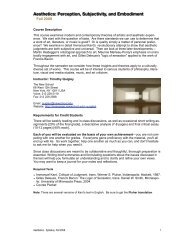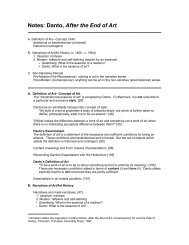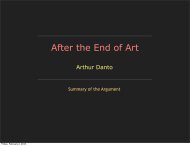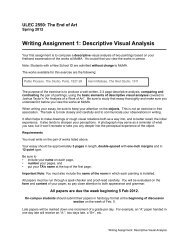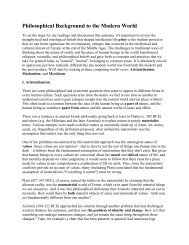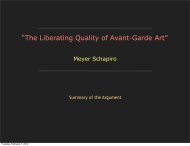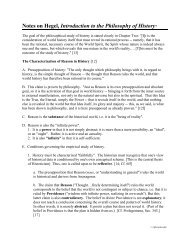You also want an ePaper? Increase the reach of your titles
YUMPU automatically turns print PDFs into web optimized ePapers that Google loves.
The truth is that it is absurd to submit to pure underst<strong>and</strong>ing the mixture of underst<strong>and</strong>ing<strong>and</strong> body. These would-be thoughts are the emblems of "the practice of everyday life,"the verbal blazons of union, permissible only if not taken to be thoughts. They are indicesof an order of existence—of humanity <strong>and</strong> world as existing—of which we are not held toproduce a concept. For this order there is no terra incognita on our map of Being. It doesnot confine the reach of our thoughts, because it, just as much as they, is sustained by aTruth which grounds its obscurity as well as our own lights.[31]We have to go to these lengths to find in Descartes something like a metaphysics ofdepth. For we are not present at the birth of this Truth; God's being is for us an abyss. Ananxious trembling quickly mastered; for Descartes it is just as futile to plumb that abyssas it is to think the space of the soul <strong>and</strong> the depth of the visible. Our very position, hewould say, disqualifies us from looking into such things. That is the secret of Cartesianequilibrium: a metaphysics which gives us definitive reasons to leave off doingmetaphysics, which validates our self-evidence while limiting it, which opens up ourthinking without rending it.M-P’s call for “a new science”.The secret has been lost, <strong>and</strong> lost for good, it seems. If we are ever again to find abalance between science <strong>and</strong> philosophy, between our models <strong>and</strong> the obscurity of the"there is," it must be of a new kind. Our science has rejected the justifications as well asthe restrictions which Descartes assigned to its domain. It no longer pretends to deduceits invented models from the attributes of God. The depth of the existing world <strong>and</strong> anunfathomable God no longer st<strong>and</strong> over against the flatness of "technicized" thought.Science manages without the excursion into metaphysics that Descartes had to make atleast once in his life; it begins from the point he ultimately reached. Operational thoughtclaims for itself, in the name of psychology, that domain of contact with oneself <strong>and</strong> withthe world which Descartes reserved for a blind but irreducible experience. Operationalthought is fundamentally hostile to philosophy as thought-in-contact, <strong>and</strong> if it rediscoversa sense of such a philosophy, it will be through the very excess of its daring; when,having introduced all sorts of notions that Descartes would have held to arise fromconfused thought—quality, scalar structures, solidarity of observer <strong>and</strong> observed—itsuddenly realizes that one cannot summarily speak of all these beings as constructs.Meanwhile, philosophy maintains itself against such operationalist thinking, plunging itselfinto that dimension of the composite of soul <strong>and</strong> body, of the existent world, of theabyssal Being that Descartes opened up <strong>and</strong> so quickly closed again. Our science <strong>and</strong>our philosophy are two faithful <strong>and</strong> unfaithful offshoots of Cartesianism, two monstersborn of its dismemberment.Nothing is left for our philosophy but to set out to prospect the actual world. We are thecompound of soul <strong>and</strong> body, <strong>and</strong> so there must be a thought of it. It is to this knowledgeby position or situation that Descartes owes what he himself says of it, or what hesometimes says of the presence of the body "against the soul," or of the exterior world "atthe tip" of our h<strong>and</strong>s. Here the body is no longer the means of vision <strong>and</strong> touch, but theirdepository.Our organs are not instruments; on the contrary, our instruments are added-on organs.Space is not what it was in the Dioptrics, a network of relations between objects such aswould be seen by a third party, witnessing my vision, or by a geometer looking over it <strong>and</strong>reconstructing it from outside. It is, rather, a space reckoned starting from me as the nullpoint or degree zero of spatiality. I do not see it according to its exterior envelope; I live itfrom the inside; I am immersed in it. After all, the world is around me, not in front of me.Light is found once more to be action at a distance. It is no longer reduced to the actionof contact or, in other words, conceived as it might be by those who cannot see.[32]Vision reassumes its fundamental power of manifestation, of showing more than itself.And since we are told that a bit of ink suffices to make us see forests <strong>and</strong> storms, lightmust have its own power to generate the imaginary. Its transcendence is not delegated toa reading mind which deciphers the impacts of the light qua thing upon the brain <strong>and</strong>which could do this quite as well if it had never inhabited a body. No longer is it a matter11


